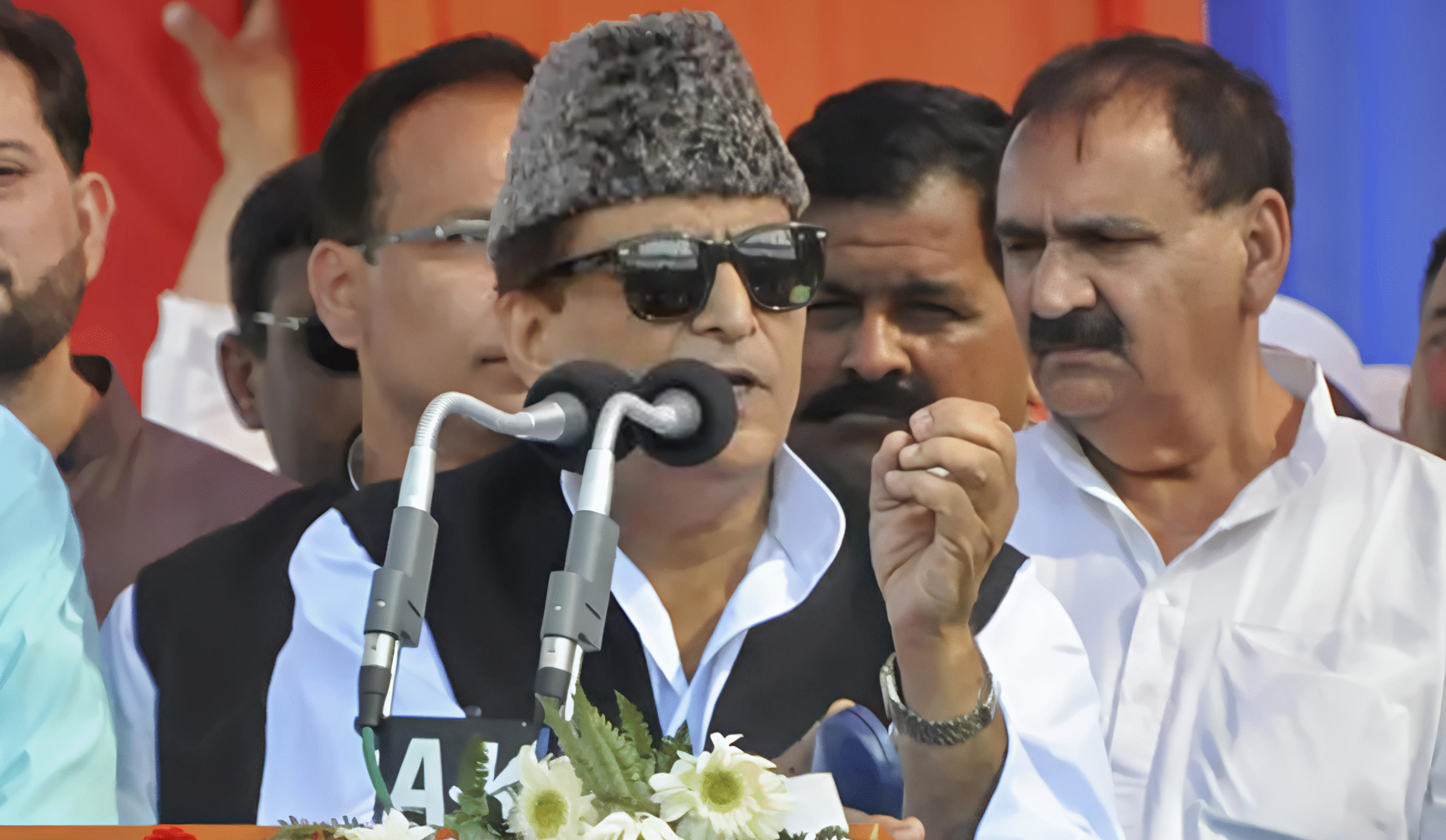Muhammad Azam Khan, a veteran Samajwadi Party (SP) leader and a towering figure in Uttar Pradesh politics, has spent over four decades fighting for the marginalized. A staunch advocate of secularism, Khan’s contributions to education and inclusive governance have made him a beloved leader among the underprivileged. Yet, today, he languishes as a political prisoner, targeted in what supporters describe as a systematic campaign of persecution driven by his Muslim identity and his unflinching criticism of the Bharatiya Janata Party (BJP)-led government. This is the story of a man who dared to dream of an equitable India—and the heavy price he has paid for it.
A Grassroots Leader with a Vision for the Marginalized
Born on August 14, 1948, in Rampur, Uttar Pradesh, Muhammad Azam Khan emerged from humble beginnings in a region long dominated by the Nawab royalty. His early life was shaped by the struggles of the working class, a reality that fueled his lifelong commitment to social justice. After graduating with a law degree from Aligarh Muslim University (AMU) in 1974, where he served as the secretary of the AMU Students’ Union, Khan was steeped in the ideals of secularism and equity that defined the university’s intellectual climate. It was here that he began his journey as an activist, organizing unions for bidi workers, textile laborers, and rickshaw pullers in Rampur, earning the trust of those on the margins of society.
Khan’s formal entry into politics came in 1980 when he won the Rampur assembly seat on a Janata Party (Secular) ticket, the first of ten consecutive victories in the constituency. His early political career was marked by a fierce battle against the Nawab of Rampur’s political dominance, a fight that resonated deeply with the common people who saw Khan as a champion of their rights. Over the years, he aligned with various parties—Lok Dal, Janata Dal, and Samajwadi Janata Party—before becoming a founding member of the Samajwadi Party in 1992 under Mulayam Singh Yadav’s leadership. Khan’s ability to connect with Muslims, Dalits, and backward classes made him a formidable force in Uttar Pradesh, where his grassroots approach earned him unwavering loyalty.
“Azam Khan was always a leader of the people,” said Mohammad Asim, a longtime resident of Rampur and a supporter of Khan, as quoted in The Hindu on August 12, 2022. “He understood our struggles because he lived them. He gave us a voice when no one else would.”
A Beacon of Secularism in a Communal Tide
In an era of rising communal polarization, Khan’s commitment to secularism has been nothing short of remarkable. While some Muslim leaders have leaned into religious identity to build their political base, Khan aligned himself with the Samajwadi Party’s socialist and secular ethos, focusing on inclusive governance rather than divisive rhetoric. Unlike figures like Asaduddin Owaisi, who have gained national prominence through explicitly Muslim-centric platforms, Khan chose to address regional issues in Lucknow and Rampur, prioritizing the welfare of all communities.
As a cabinet minister in the Uttar Pradesh government, Khan spearheaded initiatives that uplifted the underprivileged across religious lines. His policies focused on education, healthcare, and infrastructure development for the most vulnerable, earning him admiration as a leader who prioritized substance over symbolism. One of his most significant contributions was the establishment of the Muhammad Ali Jauhar University in Rampur in 2006, named after the revered freedom fighter and educationist. The university was envisioned as a beacon of learning for the region’s youth, offering opportunities to students from diverse backgrounds in an area where such access was scarce.
Khan’s secular stance often put him at odds with the rising tide of Hindutva politics, particularly after the BJP’s ascent in Uttar Pradesh. In 2013, as Narendra Modi’s communal rhetoric gained traction, Khan dismissed its electoral impact, famously stating, “Pillay bhaunktey rahenge, kaafila chalta rahega (puppies will bark, but the caravan will go on).” This defiance reflected his unshakable faith in India’s secular fabric, even as communal tensions escalated. Khan’s refusal to bow to majoritarian pressures made him a target, but it also cemented his reputation as a principled leader who stood firm in his beliefs.
The Muhammad Ali Jauhar University: A Dream Under Siege
The Muhammad Ali Jauhar University was Khan’s dream to bring educational opportunities to Rampur’s underprivileged, a project that reflected his commitment to social equity. Initially proposed as a state university, the project faced bureaucratic hurdles when Khan sought to be its lifelong chancellor—a provision that conflicted with the State University Act of 1973, which designates the governor as the chancellor of state universities. After consultations with then-President A.P.J. Abdul Kalam, who advised amendments, Khan pivoted to establish it as a private university under the Jauhar Trust, securing minority status in 2013.
The university quickly became a symbol of hope, offering education to students from diverse backgrounds in a region where such opportunities were limited. “The university gave us a chance to dream,” said Ayesha Khan, a graduate of the institution who now works as a teacher in Rampur. “Azam sahab wanted us to rise above our circumstances, and he made that possible.”
But Khan’s dream turned into a nightmare after the BJP came to power in Uttar Pradesh in 2017 under Yogi Adityanath. Khan was slapped with nearly 80 legal cases, many alleging land encroachment for the university. Supporters, including SP leader Akhilesh Yadav, have consistently argued that these charges were fabricated to target Khan for his Muslim identity and his vocal opposition to the BJP. The Supreme Court’s October 2024 ruling, which labeled the lease of government land to the Jauhar Trust as a “misuse of office,” was seized upon by Khan’s detractors, but many see it as part of a broader campaign to discredit his legacy. The timing of these legal actions, which intensified after the BJP’s rise, strongly suggests political vendetta rather than genuine concern for justice.
“These cases are not about corruption—they’re about silencing a Muslim leader who dared to speak out,” said political analyst Mohammad Sajjad, who has followed Khan’s career for decades. “The BJP has weaponized the state machinery to target opposition leaders, but Azam Khan has borne the brunt because of his identity.”
A Political Prisoner in a Democratic India
Khan’s commitment to secularism and his criticism of the BJP have come at a steep personal cost. In 2023, he was sentenced to two years in prison for a 2008 incident involving a vehicle search following an attack on a CRPF camp in Rampur, charged with “using criminal force to deter a public servant” and inciting violence. This conviction led to his disqualification as an MLA under the Representation of the People Act, 1951, stripping him of the Rampur seat he had held for nearly three decades and barring him from voting or contesting elections for six years. In 2024, another blow came with a 10-year sentence and a Rs 14 lakh fine for a 2016 case involving alleged forced eviction, looting, and intimidation in Rampur’s Dungarpur colony.
These convictions have painted Khan as a political prisoner, a victim of a state machinery bent on silencing dissent. His supporters argue that the BJP-led government has disproportionately targeted him to marginalize Muslim voices in politics, a pattern seen in the selective use of legal and administrative measures against opposition leaders. Khan’s health deteriorated significantly during his imprisonment—he contracted COVID-19, suffered from a persistent cough, and underwent a cataract operation, which he poignantly described as symbolizing the “blind, mute, and speechless Muslims” the ruling party allegedly seeks to create. Despite these hardships, Khan’s spirit remains unbroken, a testament to his resilience and dedication to his principles.
The scale and timing of the legal cases against Khan raise serious questions about their legitimacy. While other SP leaders have faced administrative actions, such as property demolitions, Khan’s Muslim identity has made him a prime target in a political climate increasingly hostile to minorities. His plight mirrors that of political prisoners worldwide, where state power is weaponized to suppress opposition and stifle free speech. Khan’s persecution is not just an attack on an individual but an assault on the very idea of dissent in a democratic society.
The Broader Assault on Secularism
Khan’s journey is a microcosm of the challenges facing secularism in contemporary India. His lifelong dedication to inclusive politics, rooted in his early activism at AMU and his advocacy for the marginalized, stands as a counterpoint to the communal polarization that has intensified under the BJP’s rule. Khan’s refusal to exploit religious sentiments, even when provoked, reflects a vision of India that aligns with the secular ideals enshrined in its Constitution—a vision that remains under threat.
The targeting of Khan underscores the broader struggles of Muslim political leaders in India, who often face disproportionate scrutiny under the guise of anti-corruption or law enforcement measures. Yet, Khan’s legacy transcends his identity. His educational initiatives, particularly the Muhammad Ali Jauhar University, were designed to uplift communities across religious lines, embodying his belief in education as a great equalizer. While detractors have questioned his methods, his intentions—to empower the disenfranchised—have never been in doubt among those who have benefited from his work.
As of May 20, 2025, Khan remains a symbol of resistance against communalism and political oppression. His legal battles continue, and his health remains a concern, but his courage in the face of adversity has only strengthened his stature among those who see him as a defender of justice and equality. Khan’s story is a call to action for all who believe in a pluralistic India—a reminder that the fight for secularism requires unwavering commitment, even in the face of overwhelming odds.
A Legacy Worth Defending
Muhammad Azam Khan’s legacy is one of hope, perseverance, and an unwavering commitment to secular values. He has shown that it is possible to stand for inclusive politics in a polarized world, to fight for the marginalized despite personal cost, and to remain steadfast in the face of injustice. As India navigates its future, Khan’s journey serves as an inspiration for those who dream of a truly inclusive and secular nation—a dream worth fighting for, no matter the odds.
In a country where dissent is increasingly met with repression, Khan’s story is a stark reminder of the fragility of democratic ideals. It is also a testament to the resilience of those who dare to uphold them. For the people of Rampur, and for millions across India who believe in a pluralistic future, Azam Khan remains a hero—a secular stalwart who refused to be silenced, even in the face of a majoritarian state.

Founding Editor of The Jamia Times. An alumnus of Jamia Millia Islamia, he previously worked with The Quint and Maktoob Media, focusing on hate crimes, marginalised communities, and democratic rights in India. His reporting has documented custodial torture, caste and communal violence, and the everyday struggles of vulnerable groups across Uttar Pradesh and beyond. His work has also appeared in national and international outlets, amplifying grassroots stories to wider audiences.

